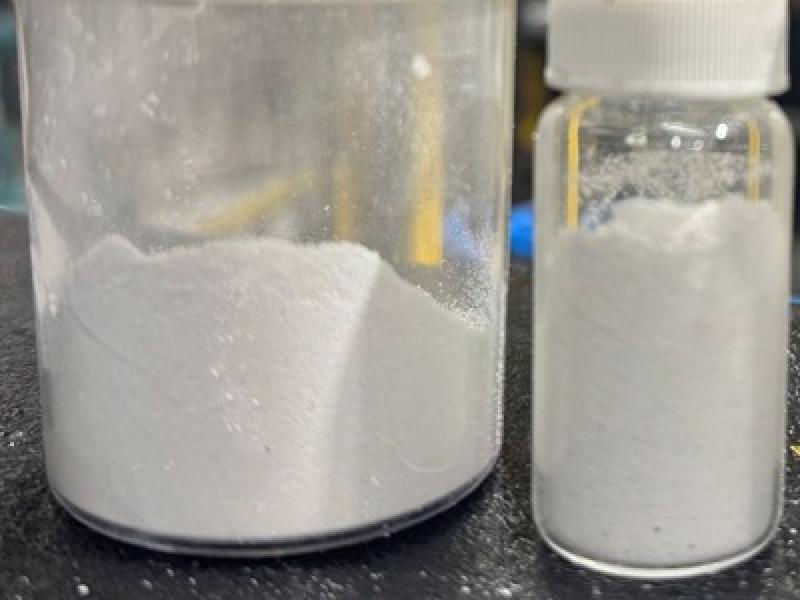
Planetary Technologies’ vice president of external relations Jason Vallis and CEO Mike Kelland (Courtesy Planetary Technologies Inc.)
Flush with $7.8 million in grants and funding, Planetary Technologies Inc. is set to significantly scale-up testing of its accelerated carbon transition platform (ACT), which employs alkalinity to improve the carbon-storage capability of the world’s oceans.
Founded in 2019 as Planetary Hydrogen, the Dartmouth, Nova Scotia-headquartered team of scientists and engineers developed a method to purify the alkaline rocks left over from mining operations. That alkalinity is then added to the oceans, the world’s largest carbon sinks, enhancing its ability to permanently sequester atmospheric carbon. The company states this will allow the carbon to be stored for up to 100,000 years.
ACT also repairs some of the damage caused by increased acidification in our oceans as a result of climate change. The alkaline procedure creates a hydrogen byproduct, which Planetary Technologies likens to giving the ocean an antacid.
The accelerated carbon transition technology has its origins in the research of biogeochemist Dr. Greg Rau, Planetary’s chief technology officer.
Planetary’s ocean CO2 removal
“The majority of carbon on the Earth’s surface, about 80 per cent, is actually locked up in ocean chemistry,” said Jason Vallis, Planetary’s vice president of external relations. “Our process takes advantage of that cycle. What we do is, we just speed it up by adding renewable electricity and water and through our electrochemical system using mine tailings, we enhance that weathering process.”
Mine tailings refers to the detritus, or waste, left over once a core mineral is extracted from the ore. These tailings are processed at Planetary’s facilities, where three tonnes of tailings translates to roughly one tonne of alkalinity and in turn, one tonne of carbon stored.
Several battery metals, such as zinc, can be extracted from tailings as part of the process.
The recent funding “kept them busy” over the past 18 months Planetary’s braintrust conducted scale tests on two ends of the carbon process. That involved scaling the processing of the mine tailings as well as safely adding the carbon to the ocean in a way that is measurable.
The company is opening two pilot plants in Quebec and Nova Scotia later this year, at which time Vallis says it will move from “kilograms of testing and processing, to tonnes of testing within the mine site.”
Test ACT process at scale
Before being able to begin commercial application of the technology, Vallis the alkalinity removal process must be tested at scale to ensure safety and to determine the limits of input for various locations in the oceans. As a result, the company will remain in a laboratory setting, for now.
Planetary counts among its partners Dalhousie University and the University of Miami BÁSICO, a student-led research group developing ocean-based carbon-capture technology.
One of the reasons Planetary is partnered with Dalhousie is proximity, but Vallis says the university is a world leader in the field. BÁSICO, founded in 2021, received $100,000 from the Musk Foundation to advance its research.
“(BÁSICO) actually came to us, but they’re looking at the impacts of humidity on coral reefs,” Vallis said. “One of the lead researchers there, Mr. Chris Langdon, (a professor of marine biology and ecology), he’s done a lot of studies on how adding alkalinity to sea water can actually improve the resilience of coral reefs to climate change.”
The Planetary scientists have also conducted modelling work at a wastewater treatment facility in the southwestern U.K. There, they’ve been able to run computer simulations showing them where carbon is in flux in the ocean, how that changes as the seasons run their course, and how detectable the carbon really is using their sensors.
Following these tests, Vallis said those models and the control experiments ongoing in the lab have to be validated before the ACT procedure can begin in earnest. Assuming no major setbacks, he predicted Planetary has another year before its technology could be used at scale.
2022 and beyond
Once the alkalinity process is ready, its first uses will be at wastewater treatment facilities. The company has already toured a Halifax Water site, and Vallis said “they’re very open to working with us,” although details still need to be finalized.
Planetary is currently selling 3,000 carbon credits with retirement dates of 2025 to 2027. The company has already pre-sold carbon credits to e-commerce technology firm Shopify based on the carbon removal to be generated by Planetary’s pilot plants later this year.
“At full-scale, Planetary’s technology will be a game-changer in reversing climate change,” said Shopify’s head of sustainability Stacy Kauk in a recent statement. “We are confident in Planetary’s trajectory and proud to support this entrepreneurial, tech-driven company through our Sustainability Fund, and we hope other companies will join our efforts to help scale carbon removal.”
What most excites Vallis about Planetary’s potential is that it is largely using existing materials and infrastructure. It already has a letter of intent to supply the amount of tailings it will need for all of its pilot activities.
“We have access to . . . potentially millions of tonnes of tailings at our pilot (facility),” Vallis said, and the firm is already sourcing additional tailings for its scale-up.
Overall, Vallis and the company have set a goal of removing 1,000 tonnes of carbon by Earth Day 2025. The long-term goal is to remove a billion tonnes of carbon by 2035.
The United Nations’ Blue Climate Initiative named Planetary as a semi-finalist for its Ocean Innovation Prize. Planetary co-founder Brock Battochio was also named to Forbes’ 2022 30-under-30 Energy List.










